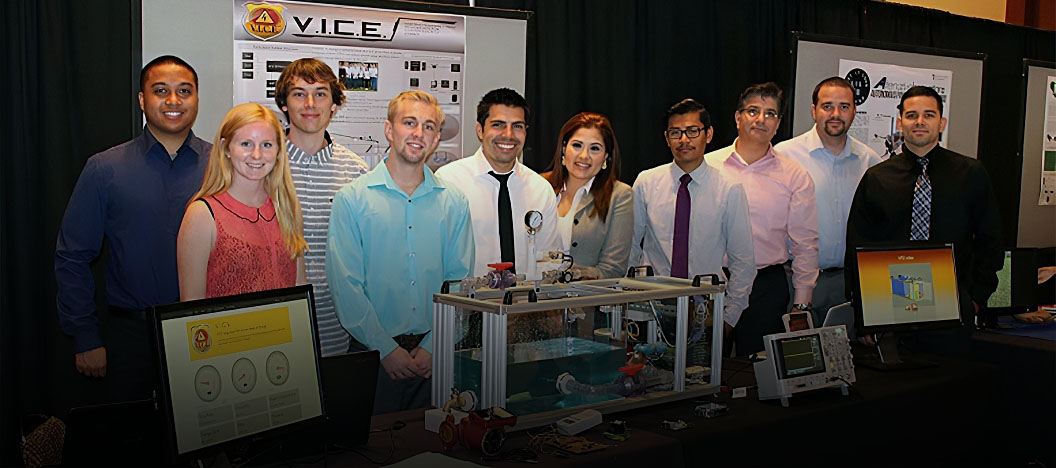Communication Systems & Signal Processing Institute
The Communication Systems and Signal Processing Institute at San Diego State University is an organized research and development unit within the SDSU College of Engineering. It was established in recognition of the fact that San Diego has become the leading world-class center of research and development in the field of wireless communication, with virtually every major wireless and cellular communication system manufacturer and provider represented among the large number of local R&D organizations. Membership of the Institute consists of faculty drawn from the College of Engineering (and primarily from the Department of Electrical & Computer Engineering), who have professional interests and expertise in different aspects of communication systems. The Institute is guided by a steering committee having industrial representation. The Institute enters into contracts with external agencies through the San Diego State University Foundation, and its laboratories are housed in the Engineering Building on SDSU campus.
Institute Goals
The Institute seeks to advance the state-of-the-art in communication systems through research, scholarship, education, service, and outreach. The Institute conducts research, development, and design work, and serves as a vehicle for fostering collaboration and scientific exchange between industry and academia. Through corporate and government sponsorship, the Institute supports faculty, graduate students, visiting scholars, and engineering professionals engaged in this field.
Areas of Expertise
The research activities in the institute span roughly the following areas:
1) Signal Processing and Information-theoretic Study of Next Generation Wireless Networks
2) Signal processing for Defense Applications
3) Antenna Design for future Wireless and Defense Applications.
The specific areas of research investigation and study reflect the breadth of faculty interests and currently include the following:
- In-band full-duplex radio
- Integrated sensing and communications
- Distributed/Federated learning
- An IRS-aided multiuser wireless communications
- Deep-receiver design for wireless commutations
- Physical layer secrecy
- Caching and machine learning in wireless communication networks
- Big data-aware wireless network design
- Massive MIMO (mMIMO) systems / Cell-free mMIMO
- Spectrum sharing techniques (LSA, CBRS, NOMA)
- mmWave communications
- Random matrix theory and information theory
- Statistical and radar signal processing
Integrating terrestrial and non-terrestrial networks
Capabilities and Facilities
The Institute infrastructure includes laboratory equipment and software for designing, testing, and evaluating high-speed DSP boards, ASICs and mixed-mode RF integrated circuits, computer networks, and optical communication links as well as high-frequency characterization and electromagnetic simulation of transmission lines and printed circuit boards. Instrumentation is available for network analysis, signal generation and complex modulation, signal analysis, precision measurements, and performance verification.
Current Activities
The Institute's current activities include the following:
- Semantic communications future networks
- Stacked intelligent metasurface-assisted holographic MIMO communications
- Signal processing aspect of integrated sensing and communications
- Self-interference cancellation for wideband in-band full-duplex radio
- AI-based spectrum awareness and allocation for next-generation wireless networks
- Distributed/Federated learning – convergence analysis and communication efficient design
- Signal processing aspect of distributed Coherent Moving target indication
Other Institute activities include teaching short courses on recent developments and organizing lecture series by invited world-class experts on state-of-the-art developments in signal processing and communication systems.
Joint Doctoral Program (JDP)
The institute faculty members are actively involved in the Joint Doctoral Program (JDP) in collaboration with the University of California, San Diego (UCSD) and the University of California, Irvine (UCI). The program involves graduate-level courses at SDSU and UCSD (or UCI) and research projects under the supervision of the faculty at the Institute and co-advised by the participating ECE faculty at UCSD (or UCI). The Ph.D. degree is awarded jointly by the two cooperating institutions.
Members
The membership of the Institute currently consists of the following individuals
- Faculty:
- Dr. Satish K. Sharma
- Dr. Yusuf Ozturk
- Dr. Santosh Nagaraj
- Dr. Ege Engin
- Dr. Tharm Ratnarajah
Contact
For more information contact:
Dr. Tharm Ratnarajah
E-mail: [email protected]

